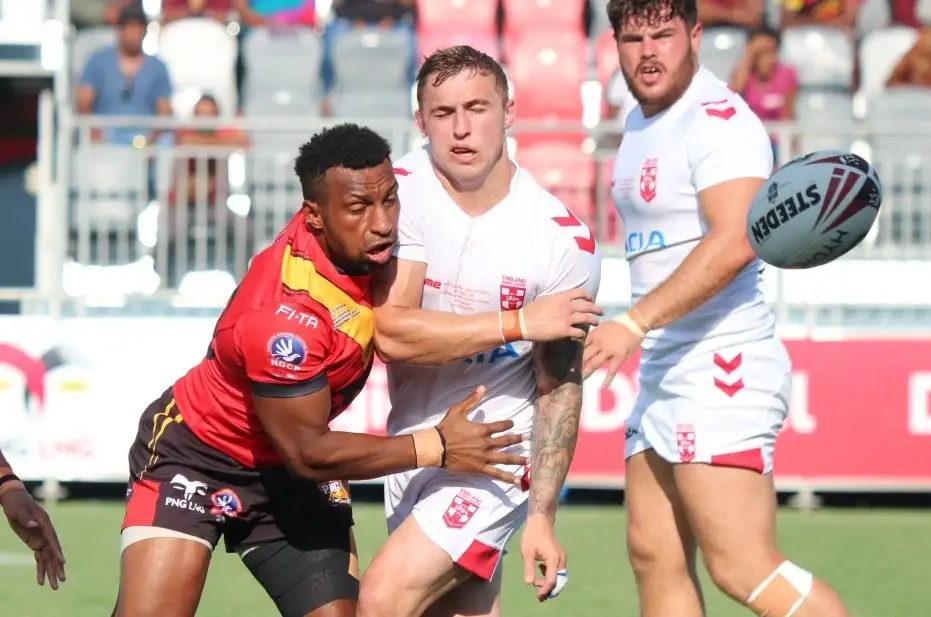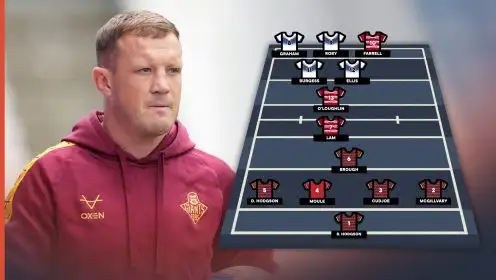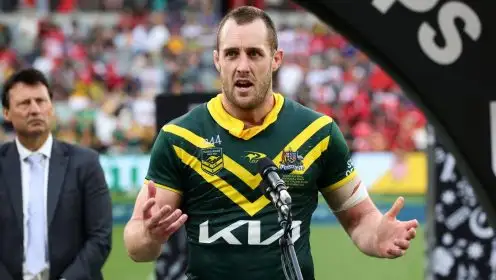Do England Knights hold the key to international growth?

It wouldn’t be an international window without getting frustrated at the lack of forward planning.
We don’t yet know when England’s next game will be after this weekend’s final test against New Zealand, nor are we even confident they will play even one game on these shores next year with no international window factored in to the Super League fixtures released on Tuesday.
The harsh reality is that despite the commendable efforts to grow the game in various outposts of the world, there are three tier one nations – England, Australia and New Zealand – though of course Tonga may have a claim to that given their performance at last year’s World Cup, even if their progress has partly contributed to the weakening of the Kiwis.
Rob Elstone’s not keen on internationals. He said something along the lines of GB, Oz & NZ ok, the rest is a nonsense. So we shouldn’t expect much from SL once the annual November love-in with internationals passes. #Rugbyleague
— Brian Davies (@BrianDavies12) November 6, 2018
The trouble that causes for England is that there are simply no competitive or attractive opponents to play in the northern hemisphere, and as such, they’re reliant on teams coming over here – which apparently Australia are reluctant to and the Pacific nations likely cannot afford to – or going Down Under.
Playing New Zealand is already getting a little familiar, hopefully the fourth meeting between the two this year won’t be a damp squib as England look for the series whitewash.
France’s progress, or lack of, has been disappointing though both they and Wales should be praised for continuing to produce players of a professional standard – and not relying on so-called heritage players like many others.
Fans have voted with their feet by not backing tests against those two nations, largely down to the fact that they are never really competitive.
But could that problem be solved by using the England Knights squad more?
So the Knights could represent England in tests against France and Wales, while the England first team goes Down Under next year.
It keeps that continuing of international rugby league, can be in the calendar, and means that each year there are games to promote on these shores.
This is of course isn’t necessarily a new idea – the old England used to feature in clashes with France, Scotland, Wales and Ireland when Great Britain existed.
The Great Britain debate is one for another piece and continues to be a bone of contention, given if the best players were picked, they would all likely be the same that currently turn out for England.
But whatever happens there, the Knights team could provide some competitive tests to sell – if there recent tour to Papua New Guinea is anything to go by. That tour could be replicated with the likes of Fiji, Samoa and Tonga too.
Thank you PNG ???
A memorable fortnight on Tour for the Knights! pic.twitter.com/JxFKUUl8xr
— England Rugby League (@England_RL) November 5, 2018
Now of course, it’s not watching the absolute elite players, but while those are playing international games Down Under, it’s not a bad alternative.
There are far too many issues within professional rugby league at the moment for it to be the RFL’s responsibility to develop nations like France and Wales to be competitive with England – the likelihood is, that it will never happen, purely because they’re so far behind the eight-ball in terms of professional clubs and players.
It was interesting to see Scotland coach Chris Chester describe his side’s second half performance against Wales as “like a pub team” because ultimately, that’s all Scotland has to work with – community/amateur clubs, with a sprinkling of professional players of heritage.
Only the French Federation have a foundation for this, by growing their existing semi-professional domestic league to be of a higher standard, and Toulouse progressing to Super League could assist this in some way.
The issue France has is that rugby union is so cash rich in their country that it’s impossible for league to compete when it comes to offering deals to players.
It’s all a moot point if Australia continue with their selfish and ignorant attitude towards the international game.
The fact is, the best team in the world needs to be playing regularly if the game is to flourish. That means them playing England or GB every year – be it at home or abroad.
There have been a lot of false dawns over the years – we have been promised a fixed international calendar for some time, yet five years after the relatively successful 2013 World Cup in the UK and France, we are still faced with the prospect of finishing an international game without knowing when the next one will be.
The RLIF appears to be at loggerheads with the ARLC, highlighted by the contrasting statements they issued in July, which were discussed at a summit in Singapore.
The apparent agreed calendar of many years ago was that a GB Lions tour would take place in 2019, followed by a Kangaroo tour in 2020 and of course the World Cup in 2021.
Australia’s reluctance to play ball has effectively resulted in a near stalemate, which means that there is very little progress being made, and all rugby league chiefs face is accusations of the game not being marketed properly.
It would be a lot easier for them to sell tickets, if games were knew well in advance and if they featured the very best players.
Speaking of which, what a farce it is that the awarding of the Golden Boot is now taking in to consideration only international matches, one of which is last year’s World Cup final.
Another thing. Who decided to change the Golden Boot so it only applies to international matches? Why change something that has always worked so well? This year’s Golden Boot takes into account last year’s World Cup Final. What is the sense in that? Who comes up with this stuff?
— Garry Schofield (@GarrySchofield6) November 6, 2018
You wonder just sometimes, whether rugby league enjoys making an embarrassment of itself. This is one of those occasions.



